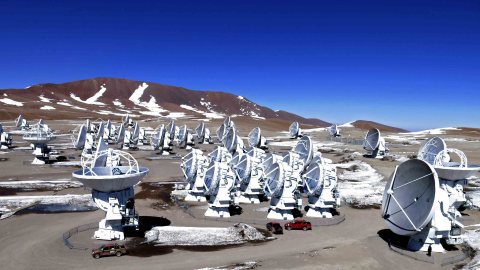Where Are All the Aliens? A Famous Physicist Gives an Answer You May Not Like

Most people have looked up to the heavens and asked, “Are we alone?”. Given the vastness of the universe, there must be thousands of other civilizations across the cosmos. The Drake Equation, which can be used to estimate the number of civilizations that must exist, nearly demands it.
But, if there are thousands of civilizations out there, where are they? We have had the ability to pick up radio signals from space for several decades, but rarely have we found any signal that even strikes us as being a possible message. These are then often debunked, such as the case when pulsars were discovered. While some signals have shown stubborn promise, the discovery of alien life remains a future event.
This discrepancy is called “The Fermi Paradox”, after Enrico Fermi, who postulated it. Where are all these aliens we suppose exist? If they do exist, why have they not colonized the entire galaxy by now? There are several common answers, and recently Dr. Brian Cox has sided with one of the least pleasant ones: that “One solution to the Fermi paradox is that it is not possible to run a world that has the power to destroy itself and that needs global collaborative solutions to prevent that”.
In other words, a civilization that has the ability to communicate across space might not have a long life expectancy — as it would also have the ability to destroy itself. Stephen Hawking is inclined to agree, stating that “I don’t think we will survive another 1,000 years without escaping beyond our fragile planet”. This idea is a popular solution, but not one that we like to think about.
There are, of course, other possible solutions. Civilized life might just be rarer than we think, or uncommon in the area of the universe we are in. It could be possible that the other life in the cosmos is so alien that we wouldn’t recognize it if we saw it — as predicted by H.P. Lovecraft in his classic work The Colour Out of Space. Other solutions abound, ranging from the idea that we are alone to the idea that some hyper civilization prevents others from reaching a particular level of technology.
It could also be the case that alien life is just uninterested in us. Humanity has only ventured beyond Earth one time, to the closest object we could land on, and is only one hundred and eight years separated from the launch of the Model T automobile. Our civilization is still in a technological infancy cosmically speaking. Our desire to find aliens might be matched by their desire to avoid us.
So, is civilization doomed to destroy itself? Should we begin the countdown to the end? Or is the Fermi paradox a sign of something else entirely? Perhaps our understanding of how much life the universe holds is wrong, and we are doomed to cosmic loneliness. In any case, Dr. Hawking reminds us to “Remember to look up at the stars and not down at your feet”.





